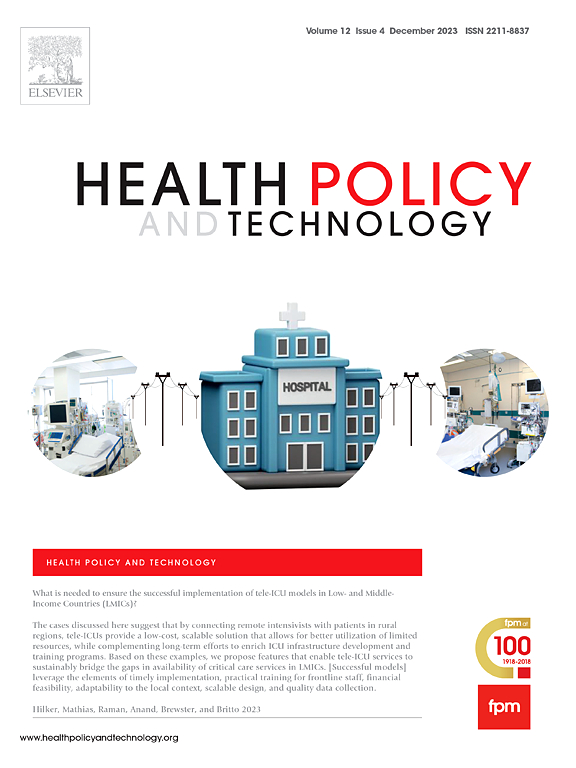Developing a framework for managing conscientious objection in healthcare - Australia
IF 3.4
3区 医学
Q1 HEALTH POLICY & SERVICES
引用次数: 0
Abstract
Background
Conscientious objection (CO) is a practitioner's refusal to engage or provide a service primarily because the action would violate their deeply held morals and/or ethical values. However, there is a lack of guidance around managing CO in healthcare. This study aims to develop and evaluate a proposed framework to assist in management of CO in Australian healthcare.
Methods
A three-round modified Delphi study of healthcare experts, was used to evaluate a proposed workplace framework to help guide management of CO in healthcare. Round 1: Assessment, Round 2: Feedback/discussion Round 3: Reassessment. The final proposed framework was collated once consensus was reached.
Results
10 expert panellists evaluated the first draft of the proposed framework. Four of eight steps required significant modifications, and others required slight rephrasing to minimise negative connotations. An additional ninth step was made based on panellists’ suggestions, to ensure greater application across various professions and scenarios. Thematic analysis generated the five key themes: 1.moral injury and workplace health and safety laws, 2.legislative rights and liability, 3.personal versus professional responsibilities, 4.stigma and communication, 5.context specific modifications.
Conclusion
A consensus framework on how to manage CO in the healthcare was developed and evaluated by healthcare experts. Implementation of the framework will require awareness, and uptake from professional organisation bodies, government policymakers and employers in healthcare to incorporate it in their workplace policies.
求助全文
约1分钟内获得全文
求助全文
来源期刊

Health Policy and Technology
Medicine-Health Policy
CiteScore
9.20
自引率
3.30%
发文量
78
审稿时长
88 days
期刊介绍:
Health Policy and Technology (HPT), is the official journal of the Fellowship of Postgraduate Medicine (FPM), a cross-disciplinary journal, which focuses on past, present and future health policy and the role of technology in clinical and non-clinical national and international health environments.
HPT provides a further excellent way for the FPM to continue to make important national and international contributions to development of policy and practice within medicine and related disciplines. The aim of HPT is to publish relevant, timely and accessible articles and commentaries to support policy-makers, health professionals, health technology providers, patient groups and academia interested in health policy and technology.
Topics covered by HPT will include:
- Health technology, including drug discovery, diagnostics, medicines, devices, therapeutic delivery and eHealth systems
- Cross-national comparisons on health policy using evidence-based approaches
- National studies on health policy to determine the outcomes of technology-driven initiatives
- Cross-border eHealth including health tourism
- The digital divide in mobility, access and affordability of healthcare
- Health technology assessment (HTA) methods and tools for evaluating the effectiveness of clinical and non-clinical health technologies
- Health and eHealth indicators and benchmarks (measure/metrics) for understanding the adoption and diffusion of health technologies
- Health and eHealth models and frameworks to support policy-makers and other stakeholders in decision-making
- Stakeholder engagement with health technologies (clinical and patient/citizen buy-in)
- Regulation and health economics
 求助内容:
求助内容: 应助结果提醒方式:
应助结果提醒方式:


